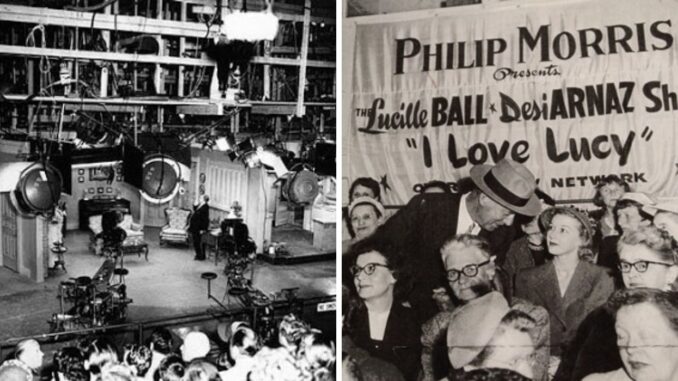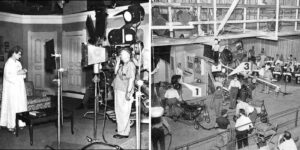
Introduction: Why ‘I Love Lucy’ Still Matters Today
When you think of classic television, I Love Lucy is often the first show that comes to mind. But beyond its comedic brilliance, this beloved sitcom revolutionized the entertainment industry. From its innovative filming techniques to tackling taboo topics, I Love Lucy set a new standard for what TV could achieve. Let’s dive into 10 ways this iconic show broke barriers and left an indelible mark on television history.
1. First Sitcom to Use a Multicam Setup
One of the most revolutionary aspects of I Love Lucy was its use of a multi-camera setup, which was practically unheard of in the early 1950s. By utilizing three cameras to film in front of a live studio audience, the show captured real-time reactions, adding authenticity to its comedy. This technique became the gold standard for sitcoms, influencing everything from Friends to The Big Bang Theory.
2. First Interracial Couple on TV
Lucille Ball and Desi Arnaz, who played Lucy and Ricky Ricardo, were more than just co-stars; they were trailblazers. Their on-screen portrayal of an interracial couple was groundbreaking at a time when such representations were rare. In a post-war America, this was a bold move that helped normalize interracial relationships on television.

3. Created the Rerun Concept
Did you know that I Love Lucy was responsible for the invention of reruns? When Lucille Ball was pregnant, the production team had to find a way to keep the show on the air. They decided to re-broadcast previous episodes, giving birth to the rerun format we all rely on today.
4. Addressed Pregnancy on Screen
Speaking of pregnancies, Lucille Ball was the first actress to openly address her real-life pregnancy in a TV show. This was a groundbreaking moment in television history, as pregnancy was considered a taboo subject. The storyline was handled with humor and grace, setting a precedent for future shows.
5. Revolutionized Syndication
I Love Lucy was one of the first shows to be syndicated, which means it was sold to multiple television stations. This not only extended its reach but also changed the business model for TV production, showing that a show’s value could live on well beyond its original run.
6. Pioneered Product Placement
Before influencer marketing was a thing, I Love Lucy was mastering product placement. Remember Lucy’s famous Vitameatavegamin commercial? This seamless integration of advertising within the storyline set the stage for modern product placements in television and film.

7. Broke Gender Norms in Comedy
Lucy’s character wasn’t your typical 1950s housewife. She was ambitious, mischievous, and often the driving force behind the show’s comedy. Lucille Ball’s physical comedy prowess broke gender norms, proving that women could be just as funny—if not funnier—than their male counterparts.
8. Featured a Strong Female Lead
At a time when women were often relegated to secondary roles, Lucy Ricardo was the star. Her character wasn’t just a supporting figure; she was the heart and soul of the show. This empowered future generations of female comedians and actresses.
9. Tackled Real-World Issues with Humor
Though primarily a comedy, I Love Lucy didn’t shy away from addressing real-world issues like immigration and gender roles. Through the lens of humor, the show explored themes that resonated deeply with its audience, breaking barriers in how sensitive topics could be presented.
10. Set the Stage for Modern Sitcoms
I Love Lucy didn’t just entertain; it set a blueprint for the modern sitcom. Its influence is evident in countless shows that followed, from Seinfeld to Parks and Recreation. The show’s ability to blend humor, heart, and groundbreaking innovation remains unmatched.
The Legacy of ‘I Love Lucy’
It’s been decades since I Love Lucy first aired, but its impact on television remains undeniable. By pushing boundaries and setting new standards, the show didn’t just break barriers; it obliterated them. Whether it’s the laughter, the lessons, or the legacy, I Love Lucy continues to be a cultural touchstone that reminds us of the power of storytelling.
Conclusion: Why ‘I Love Lucy’ Will Never Be Forgotten
From pioneering technical innovations to smashing societal norms, I Love Lucy wasn’t just a sitcom; it was a revolution. The show proved that television could be more than just entertainment—it could be a force for change. And for that, it will always hold a special place in the annals of TV history.
FAQs
1. Why was I Love Lucy so groundbreaking?
I Love Lucy was revolutionary for its time, introducing technical innovations like multi-camera setups and tackling social taboos such as interracial marriage and pregnancy on screen.
2. How did I Love Lucy influence modern television?
The show set the standard for sitcoms with its unique blend of humor, innovation, and storytelling, influencing countless shows like Friends and The Office.
3. What made Lucille Ball’s comedy style unique?
Lucille Ball was a master of physical comedy and timing, breaking gender norms by proving women could lead in comedy with unmatched charisma and talent.
4. Is I Love Lucy still relevant today?
Absolutely. The show’s themes of love, ambition, and humor are timeless, and its innovations continue to influence television production today.
5. What legacy did I Love Lucy leave behind?
Its legacy includes setting industry standards, pioneering new television formats, and showing that storytelling could challenge societal norms—all while keeping audiences entertained.